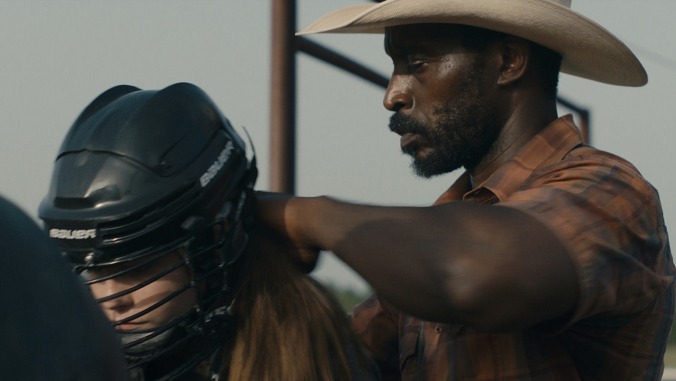The protagonist, Kris (Amber Havard), is a 14-year-old who lives with her grandmother and younger sister right next door to Abe (Rob Morgan), the aforementioned rodeo clown. (Or “rodeo protection athlete,” in the preferred nomenclature). Kris’ mother, Janis (Sara Allbright), is behind bars, and the girl seems predestined to follow her example by trying to impress the wrong crowd. That includes breaking into Abe’s house while he’s gone for the weekend so that her racist hick friends can party, steal his pills, and chug his booze. After Abe returns to find Kris passed out on his couch, he calls the cops, but Kris’ grandma pleads with him to make a deal. He agrees to not press charges as long as the kid cleans up the mess and continues to help him around the house. Slowly, Kris begins to develop an interest in bull riding; Abe takes a shine to her without ever truly softening his cantankerous exterior.
Morgan, who has a sizeable résumé of supporting roles in film and TV, gives a deeply believable performance as Abe, a man whose years of rodeo injuries have left him bitter and stiff. Silverstein’s willingness to empathize with these more aggravating traits of her characters is one of the better qualities of her debut feature. (It might have something to do with the fact that the rest of the cast, which is otherwise composed almost entirely of nonprofessionals, give performances that are one-note.) The other is an element of documentary verisimilitude. Abe is Black, whereas Kris and everyone she knows is white, and her gradual involvement in his life allows Bull to peer into the unexplored world of modern African American cowboydom. Unsurprisingly—given her weakness for peer pressure—Kris’s interest in the bull ring initially comes by way of the teenage boys who hang around the pens and stables, though Abe warns her away, thinking that she’ll corrupt the clean-cut kids.
By the laws of social-realist physics, Kris’s path to finding herself inevitably involves a certain number of broken promises and lost ways, as she also becomes involved in dealing oxycodone for her mom’s ex-boyfriend, Billy (Steven Boyd), who looks like the textbook definition of a skeeze. Bull is not a fast-paced or especially dynamic movie, and while that sometimes helps it in terms of characterization, it also turns the film into a slow-rolling Ken Loach-esque portrait of opiod-crisis America—minus the miserablist follow-through. In fact, it appears to end just as it’s beginning to articulate its conflicts. Perhaps this is because the logical third act that Silverstein has set for this story would be either be sentimentally hokey or tear-jerking. But while one can respect Silverstein’s obvious distaste for phoniness and her doc-style readiness to just let people be, the result is a drama that doesn’t so much wrestle with its characters as acknowledge that they exist.
